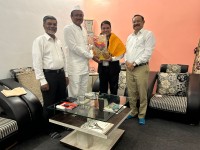- Sociapa Bags the Digital and Creative Mandate for Madhusudan Dairy
- Vancouver Interior Painting Now Offering Complete Interior Painting and Drywall Repair Services in Greater Vancouver
- VMS General Trading LLC-Announces Unbeatable Bulk A4 Paper Sale
- Karan Johar and Guneet Monga Kapoor’s \'Gyaarah Gyaarah\' trailer breaks time barriers on ZEE5
- JIS Fall Registration Now Open: Showcasing Fall’s Finest Trends and a Vibrant Buying Experience
- The Creative Leather Unveils Iconic Leather Trench Coat for the Modern Trendsetter
- Randstad India Inaugurates Karnataka's First Cloth Bag Vending Machine as Part of CSR Initiative
- Israel Mgdesyan, Head of the sales department of AVTODOM Electro, spoke about the features of operating LiXiang electric cars
- Samurai Movers Expands Exceptional Moving Services to Westminster and Wheat Ridge
- Meticulous Research® Publishes New Report on the Li-ion Battery Recycling Market
- Studio52 Listed Among the Top Animation Production Companies in the UAE
- The Animal Care Organization Inaugurates a Veterinary Hospital with Animal Birth Control Unit & Mobile Health Van at Faridabad
- Barcelona Premier Soccer Club Announces the Launch of Elite Soccer Academy in San Antonio
- Xedos Technologies Announces Launch of Xedos Digital, a Comprehensive Digital Marketing Division
- STEMart Announces Transportation and Distribution Simulation Services for Medical Device Manufacturers
 Mail to a Friend Mail to a Friend |
|
     |
Only 25% of enrolled school aged children accessed education during school closures in Delhi
22 November 2021: A recent survey showed that only 25% of enrolled school-aged children accessed education during school closures in Delhi, despite high levels of internet connectivity.
The 2021 survey, conducted by policy think tanks LIRNEasia and ICRIER, showed that 84% of households in NCT Delhi have an internet connection: 22 percentage points higher than the national average. Although the survey also shows that the high level of household connectivity in Delhi helped it to better adapt in certain aspects during the COVID-19-induced lockdowns, it did not translate to gains in education.
Only 25% of school aged children had any access to formal education during school closures in Delhi. In contrast, 40% had access to education in Tamil Nadu. Access was even low amongst the households with internet connectivity, indicating that while internet connectivity helped enable access to education, it did not guarantee it.
However, higher levels of household connectivity was seen enabling 19% of Delhi?s employed residents working from home during what they considered the most severe lockdown: this was nearly double the national average of 10% as well that of states such as Tamil Nadu and Maharashtra. Further use of telemedicine in Delhi was greater than the national average --- 45% of those the Delhi?s population aged who required access to healthcare during what they considered the most severe lockdown used online health consultations services, as opposed to the national average of 38%.
The survey findings were released at a virtual launch event conducted on 12 November 2021, which included a panel discussion with leading government, private sector and civil society representatives. Panelists included Dr. Jaijit Bhattacharya (President, Centre for Digital Economy Policy Research), Abhishek Singh (President & CEO, National e-Governance Division, Ministry of Electronics and Information Technology), Nishanth Baghel (Director of Technology Innovations, Pratham) and Helani Galpaya (CEO, LIRNEasia). The discussion was moderated by Dr. Rajat Kathuria (Senior Visiting Professor, ICRIER).
About the research: The research was conducted by LIRNEasia and ICRIER, and funded by IDRC through a joint grant given to three regional think tanks: LIRNEasia, Research ICT Africa and Instituto de Estudios Peruanos. The nationally representative sample for the survey consisted of 7,000 households across India including 350 villages and wards. The sampling methodology has been designed to ensure representation of the target group (population aged 15+) at a national level with a confidence level of 95-percent and a +/-1.7% margin of error. The data also allows for disaggregation by urban/rural divide, gender and socio-economic classification at the national level and at the state level for 4 focal states, Delhi, Assam, Tamil Nadu, and Maharashtra. The findings for these states are representative at a state level with a confidence level of 95-percent and a +/-6.2% margin of error.
About LIRNEasia: LIRNEasia is an Asia Pacific ICT policy and regulation think tank. Its mission is to catalyze policy change through research to improve people?s lives in the emerging Asia Pacific by facilitating their use of hard and soft infrastructures through the use of knowledge, information and technology.
About ICRIER: ICRIER is an autonomous economic policy think tank. ICRIER?s main focus is to enhance the knowledge content of policy making by undertaking analytical research that is targeted at informing India?s policy makers. The Digital Economy, Startup and Innovation (DESI) team at ICRIER is deeply invested in areas of digital access, internet governance and market competition.
Company :-Kaizzen
User :- Srishti Srivastav
Email :-srishti@kaizzencomm.com



_thumb.jpg)






